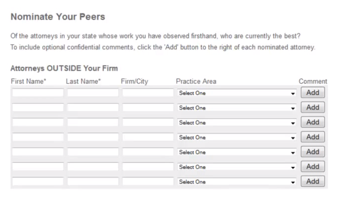Step-by-step instructions with screenshots for Avvo, SuperLawyers, Facebook, LinkedIn, and Yelp.
Table of Contents
Your Online Reputation
Avvo
SuperLawyers
- How to become a “Super Lawyer”
- Managing your SuperLawyers.com profile
- Nominate your peers
- Evaluate lawyers
- Advertising options
Yelp
Your Online Reputation
Gone are the days when first impressions are made in person or at networking events. Instead, lawyers now find colleagues and potential clients derive their first impressions of them online first. Whether through your firm’s website or a review from a past client, the Internet is where you stand to establish yourself as a true professional. And with 76% of adult Internet users hitting the Internet when they want to hire an attorney, you stand to lose out if you don’t participate.
But bad reviews + poor online profiles + a failure to manage it all properly = leaving a bad impression on potential clients. And it can be hard to undo these setbacks. It’s not impossible but it’s a lot harder to fix your reputation after it’s taken a hit than to prevent these dents in the first place.
With that in mind, let’s take a look at some of the most important legal profiles you need to have online and how to manage them effectively.
Avvo
Avvo.com is a way for lawyers to market themselves directly to consumers by creating robust profiles that act as online résumés. This service is free and essential for lawyers to utilize effectively. Failing to leverage your Avvo profile is to miss out on substantial opportunity.
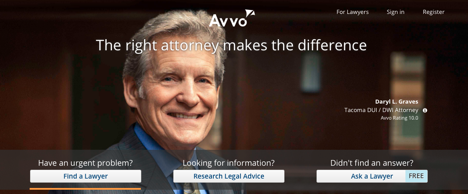
Benefits and Drawbacks
There’s a lot of good to be said about this site. It gets at least 2 million visitors a month. It offers transparency for consumers. If a lawyer is a dud, the public can easily find out about it. If the lawyer is fantastic, good reviews will let people know that as well. Once your profile is set up, a quick Google search of your name should see your profile at the top of the results. The SEO benefit is huge.

But it’s not all roses for Avvo. Once you set up a profile, you can’t delete it, which means if you’ve racked up a bad reputation, you can’t undo it quickly. You don’t have complete control over what appears on your profile, either. Bar sanctions will show up automatically, but since this is public information anyway, this should come as no surprise. The numerical rating the site gives you can be a bit off-putting since it gives consumers a basis to make decisions yet it’s not all that empirical.

But the biggest complaint (by far) is the fact that when some lawyers go to sign up, they find a profile has already been created for them. While you can “claim” your profile, if you are unaware of the fact that you have a presence on Avvo, information about you and your practice–which could be incorrect or damaging–is public knowledge. Some lawyers interpret this as Avvo forcing people to use its site. Some have even filed lawsuits against the company, but all have been dismissed thus far.
On the less severe end of the spectrum, some lawyers are dissatisfied with their experience with the Avvo Lawyer Ranking System. The algorithm used to determine each attorney’s score is hard to pinpoint. And if your potential for obtaining new clients is based on this score, that’s a heavy load for an indeterminate factor.
One final drawback is the fact that anyone can leave a client review. Many lawyers fear the day when either a dissatisfied client or an unhappy loser from the opposing party in a lawsuit posts a review that is damaging. Worse yet, you can’t remove these reviews once they’ve passed the approval system.
Despite all of this, Avvo is still worth signing up for. It’s better to control your online reputation as much as you can, and claiming your Avvo profile is the best way to start.
Setting up your profile
Your first step is to claim it. To do this, you need to click on the Claim your profile now link featured on the homepage then search for your first and last name. Include your city, state or zip code. Then press Search.
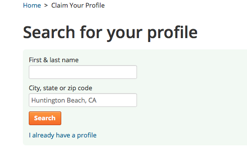
If you are a new lawyer, it is possible that Avvo may not have acquired your information yet. This is especially true if you’ve only just received your license number. If this is the case, you’ll be given the option of creating a profile from scratch.
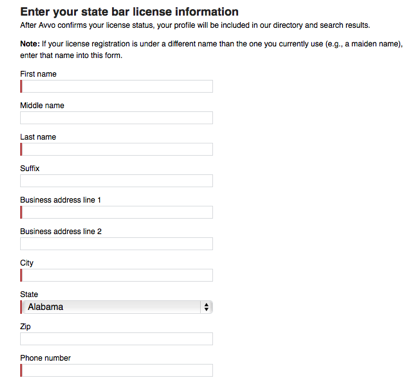
For most, at least some information will be included in a rudimentary profile. Once you find a match, claim it.
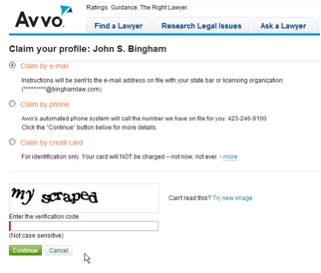
You’re given the option to claim by e-mail, phone, or credit card. Pick the option that best suits you. You’ll need to verify your identity before you can alter your profile in any way. This is to prevent fraudulent claims.
Once you’ve been given access to your account, review all of the existing information. If incorrect, change it. Then, set some time aside to fill out your profile completely. This is very important.
Include a tag line that will separate your profile from other lawyers out there:
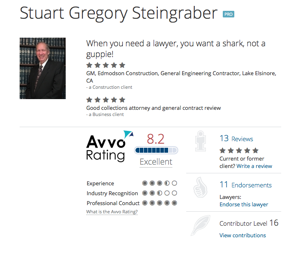
Fill in information about your practice areas, your fees (whether they are contingent or fixed), and your accepted payment types.
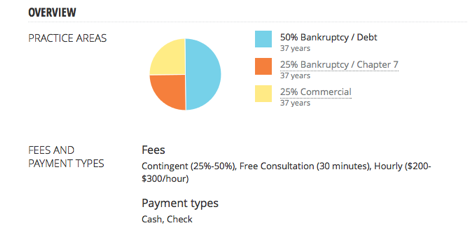
Provide your complete contact details and edit your “About Me” section. Just a short blurb and a photo appears on your main profile page, but additional photos and videos will appear on an expanded bio page, so feel free to elaborate a bit. The more personalized you can make your profile, the better.
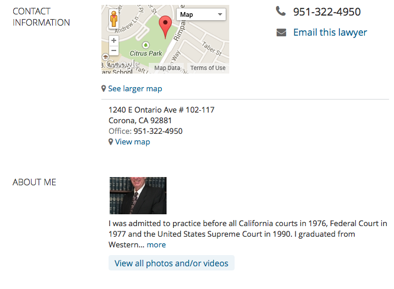
And make sure to include a recent professional photo of yourself. Profiles with photos are more likely to be clicked on in search results.
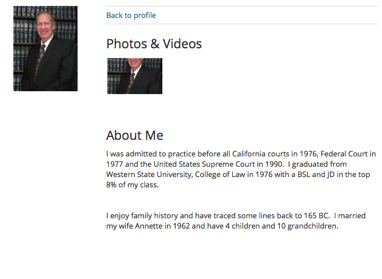
The next section of your profile is your online résumé. Remember: be thorough and complete as you fill out each section.
First and foremost is your licensing information.
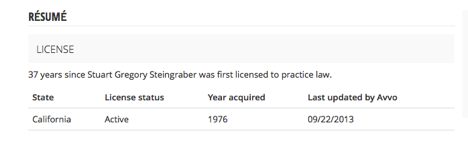
If you’ve had any disciplinary actions or misconduct claims filed against you, they will appear next. You cannot remove these.

Next, fill out your employment history. You don’t have to include every job you’ve ever held, but remember that your pre-law jobs add character to your profile.
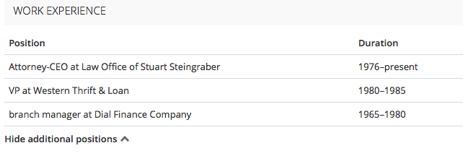
Fill out your education information. Include every degree you’ve earned.

List any awards you’ve received during your career. While including that award you received in college for Excellence in Karate is fine, just know it won’t contribute to your Avvo rating–relevancy is key.

Next, provide details about any associations or professional organizations you’re a part of. You should definitely have at least one thing listed here: your State Bar membership.

Next up, include any articles you’ve written, including the publisher and publication date.

Information on seminars and events you’ve spoken at is next. Include the name of your presentation, the conference’s name and the date.

Boosting your rating
There are several things you can do to increase your Avvo rating. As mentioned above, you can fill out every section as well as you can. Being very experienced helps as does having officer or leadership positions in bar or other associations.
Third-party references
Part of being thorough means getting plenty of endorsements from other lawyers you know personally and professionally.
You can ask colleagues, classmates or friends to provide your endorsements. Their relationship with you will be clearly identified in their endorsement for transparency’s sake.
People from your firm can’t give you an endorsement. Likewise, you should never ask someone you don’t know personally for an endorsement. It’s bad form and defeats the purpose of the system.
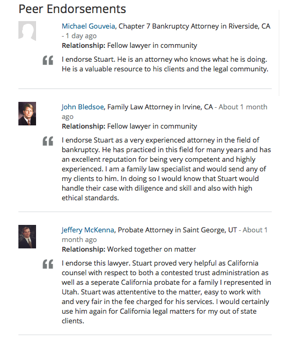
Use the Peer Endorsement Request form to solicit endorsements:
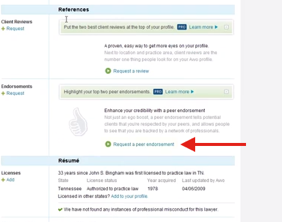
You can input up to 50 e-mail addresses and each potential endorser will receive a separate e-mail requesting their participation. Good endorsements from other lawyers directly factor into your numerical Avvo rating.
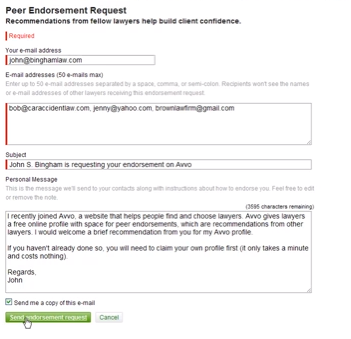
Basically, you want to get recognition from as many third-parties as possible.
Another important part of your profile is client reviews. While client reviews won’t boost your rating, they will directly impact a potential client’s first impression of you.
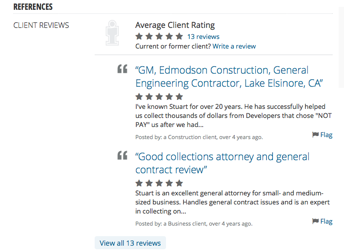
Now, some states have ethics rules that prevent lawyers from soliciting testimonials so always be sure to check before you do so.
If everything’s okay, you can use the client rating request form to ask for testimonials from clients for whom you’ve done your best work.
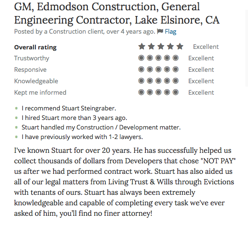
Establish yourself as an authority.
On your profile, you’ll notice there is a Portfolio section that details your participation on Avvo.com. This is where potential clients can see a rundown of how many legal answers you’ve provided as well as any legal guides you’ve written. Your contributions to the site are one of the best ways to flex your law knowledge muscles and show you really know your stuff.
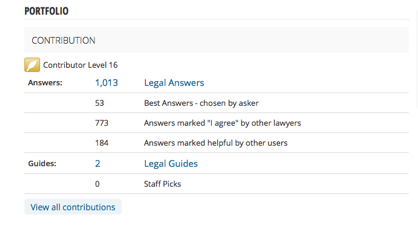
To begin, answer questions on the Q&A Forum. Stick to your area of practice to emphasize your specialization.
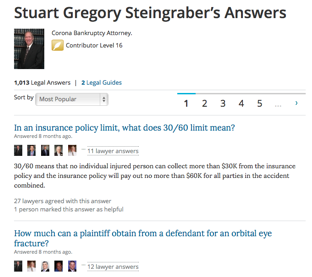
The Q&A Forum gets at least 50,000 visitors a month and hundreds of thousands of questions have been answered so far.
You earn points for answering questions. Answering questions fast (within a short time after they’re first posted) increases the point worth.

The more points you get, the more likely you’ll appear on the leaderboard, which is reset each week. It’s great publicity and basically a free advertisement for your profile and your firm. Staying at the top of the leaderboard also increases the likelihood that you’ll get interview requests passed on from Avvo, so it’s a worthwhile time investment.
Another way to boost your Avvo.com authority is to create a Legal Guide. They make for quick reference tools for consumers and allow you to, again, show off your legal chops.
The FAQ (Frequently Asked Questions) format always seems to do well. Stick to subjects related to your practice and always include a disclaimer at the bottom that indicates people should consult with an attorney for personalized advice.
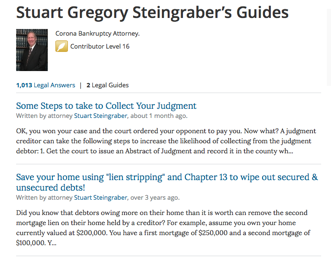
If you’re stumped on ideas for writing a legal guide, think of the questions you’re faced with most often in your practice. Other consumers will likely want to know the answers, too.
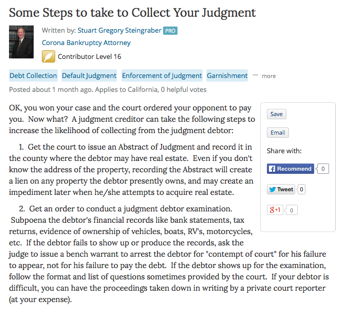
Remember: not everything is included in your Avvo score like: your personality, your knowledge of the law, how well you communicate, or how well you’ve performed in previous cases. Still, do your best to get your rating as high as possible.
Managing your Avvo reputation
Letting people know you have a presence on Avvo is a good start.
To do this, you can:
Include an Avvo badge on your website
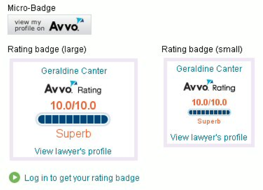
Include an Avvo activity widget on your site
If you’re a frequent forum user, this is a great way to add dynamic content to your website and show you’re active in your field.
To install this widget, go to:
- Dashboard > Syndicate your ratings & contributions
- Then, paste code you’re presented with directly into your website’s HTML.
Share your positive feedback on social sites
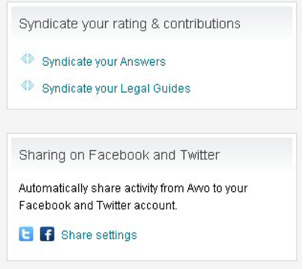
By adding your Facebook and Twitter account info to Avvo, your endorsements and reviews of 4 stars or higher can be automatically shared on your social accounts. Yes, it’s a form of bragging, but it’s important to let people know others believe in your work.
Explain bar actions
If there are misconduct claims on your profile, try to explain them as thoroughly as you can. They won’t be removed but you can at least have your say.
Challenge negative reviews
All reviews pass human eyes before being posted but some fake ones still make it through on occasion. If you feel they violate Avvo’s policies or are inappropriate, flag them.
Respond to negative reviews promptly
If the review is found to be legitimate, do your best to respond to the complaint directly and quickly. Invite the dissatisfied to call you to talk over the problem. Be responsive and helpful. The past client just might edit his or her review to reflect your actions.
Decline negative endorsements
It’s rare but it does happen sometimes. You don’t have to accept a negative endorsement from a lawyer. In some ways, this is even more important than patrolling your client reviews: endorsements directly affect your Avvo rating; reviews do not.
SuperLawyers
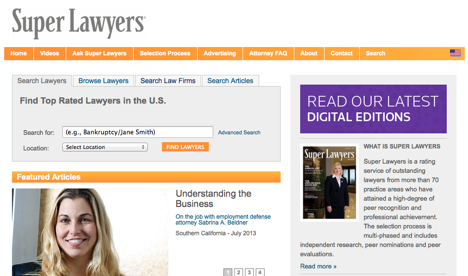
SuperLawyers is “a rating service of outstanding lawyers from more than 70 practice areas,” with a selection process involving “independent research, peer nominations and peer evaluations.” The process was actually patented as of April 2013. There is a magazine version of the site that’s been in existence much longer. Now, the site allows consumers to quickly find out an attorney’s reputation with just a simple search.
How to become a “Super Lawyer”
The selection process is quite grueling. It involves the combination of peer nominations and evaluations with third-party research. Twelve separate areas of achievement and peer recognition are looked at before annual selections are made in each state. Only Legal Aid attorneys and those in private practice will be considered for inclusion.
How to get into the candidate pool
Lawyers are entered into the candidate pool by either formal nomination or during the research process. Formal nominations are solicited from lawyers each year. They are asked to nominate who they believe are the top attorneys. These must be lawyers they’ve observed in person. Super Lawyers also conduct research throughout the year and may nominate lawyers who have certain credentials.
Evaluation
Once the candidate pool is created, these lawyers are evaluated by the research team. Twelve factors are considered, each with different point values:
- verdicts and settlements
- transactions
- representative clients
- experience
- honors and awards
- special licenses and certifications
- position within a law firm
- bar and other professional activity
- pro bono and community service
- scholarly lectures and writings
- education and employment
- other achievements
Practice area-based peer review
The best lawyers from the evaluation phase go through a peer review. Super Lawyers calls this the blue ribbon review and involves putting all candidates into groups based on practice area. Then, the lawyers in each group with the highest number of points serve on the panel for that practice area. This panel then reviews the candidates in the group and rates them from 1 to 10.
Verification and Publication
Final selections are made, representing only 5% of all lawyers in any given state. Each lawyer that makes the list has his or her license checked. The lawyers must also verify they’ve never been subject to disciplinary actions. Then the final list is published online and in regional and state versions of the Super Lawyers Magazine.
A note on Rising Stars
All candidates for Rising Stars are selected in the same manner as above, only each lawyer must be 40 or younger and/or have been in practice for 10 years or less. Only 2.5% of lawyers in a state make the Rising Stars list.
Managing your SuperLawyers.com profile
If you’ve been selected for a Super Lawyers list, you will need to verify and manage your profile information. To begin, go to http://my.superlawyers.com.
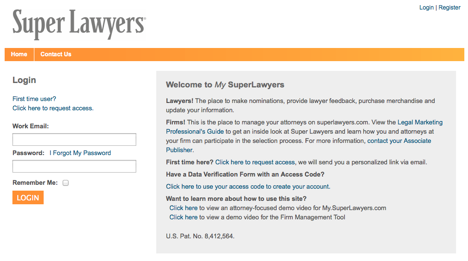
If you are a first time user, you will need to request permission to access the site. Click the appropriate link beneath where it says Login.
Select Access Request from the drop down menu and fill in your details.
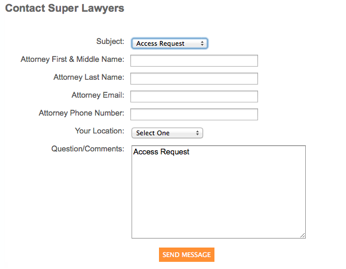
You will receive an email from mailer-noreply@superlawyers.com with a personalized link that grants you access.
You’ll then be presented with a view of your Dashboard.
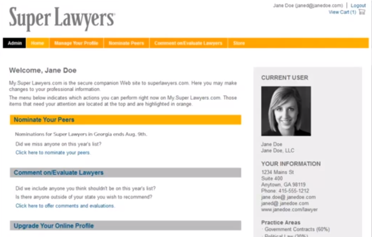
If you’ve been selected to a Rising Stars or Super Lawyers list, you’ll see “view cart” in the upper right hand corner of the page:
 You should also see many subheadings on the main dashboard like Nominate Your Peers and Upgrade Your Online Profile. The order of the subheadings will be rearranged and highlighted in orange to emphasize importance depending on the time of year.
You should also see many subheadings on the main dashboard like Nominate Your Peers and Upgrade Your Online Profile. The order of the subheadings will be rearranged and highlighted in orange to emphasize importance depending on the time of year.
One of these subheadings should read Personalized Badge.

A badge makes it easy for visitors to your website to see you are a Super Lawyer. When you click the download your badge link you’ll be taken to a page that provides several badge options.
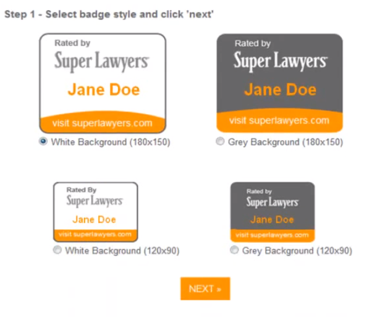
Make your selection then click Next to receive a code snippet you can paste into your website.
Updating your information
You should update your profile immediately after the Super Lawyers list is published in your regional market so the research team can review your info while researching the next year’s list. To do this, click on Manage Your Profile.
![]()
A basic profile includes your name, firm, and years of selection. This is free and will appear on the site as soon as you’re listed.
If you want additional information to be displayed, you’ll need to purchase a premium or expanded profile.
Note: Whether you pay or not, fill out your information completely. This triggers the research team to evaluate you for the selection process.
Your first step is to verify your information.
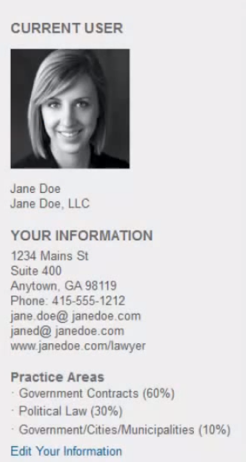
You should see a note highlighted in red at the top of your profile management page indicating as such:

Review the details you’re presented with and make sure all of your information is correct and complete.
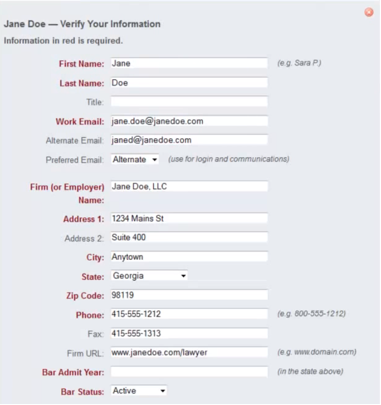
You also need to verify you are currently in good standing as a lawyer. Fill out the Good Standing Attestation in its entirety.
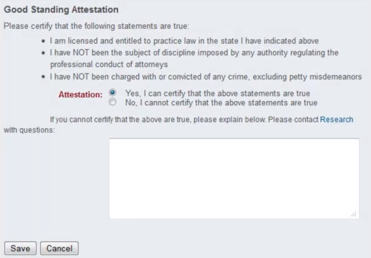
From here on out, we’re going to look at the internal view of your http://my.superlawyers.com profile manager and the external view of a published expanded profile side by side for easier reference.
This is what an expanded profile generally looks like:
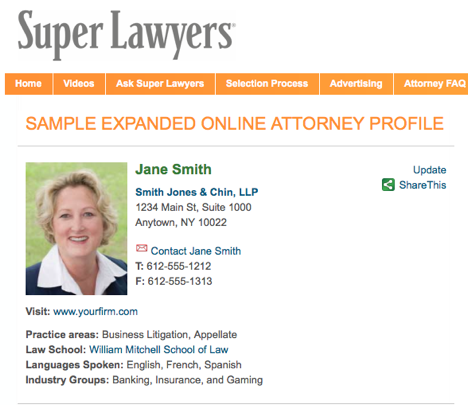
One of the first areas you will need to edit is the Summary Statement.

This is where you detail your life’s work. Talk about what you’ve achieved in your career as a lawyer and include some details about your personal life for flavor.
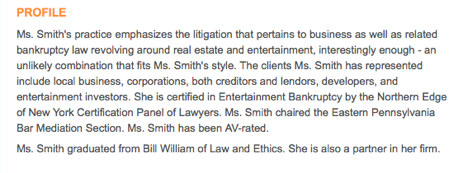
Next, you should edit the international locations where you’ve practiced law.


The next section in the profile manager isn’t actually editable. It shows the years you’ve been selected to be included in a Super Lawyers list.
![]()
This shows up on your live expanded profile like this:

And…

The next part is the nitty gritty of your profile. Here is where you fill out your About information. Below each section, there is a button that says Edit Item. Click this button to modify the content in the section above.
Note: Fill out each section completely. The more information you provide, the more likely it is you’ll be considered for next year’s list.
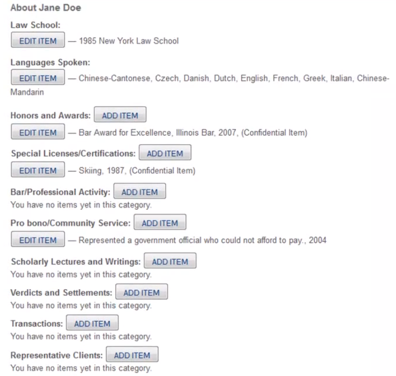
Once published on your expanded profile, the information you input will appear as follows:
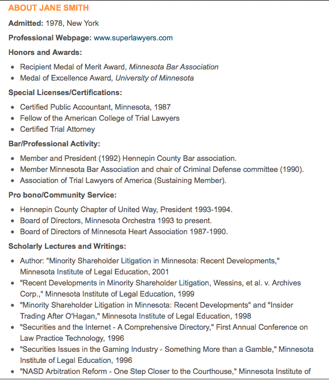
Remember: all of these areas weigh directly on your rating. If you’ve yet to make it onto a Super Lawyers list, completing your profile can help attract attention from the research team.
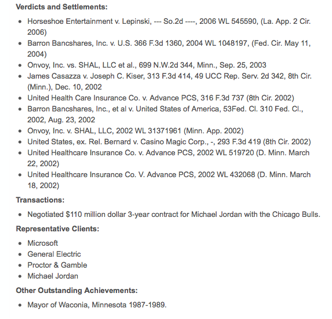
In the next section of the profile manager, you will be prompted to input relevant website addresses for your practice. These can include a link to your professional bio, your blog, your blog feed, and the practice area your blog covers. Click Edit Item(s) to modify these links.

On your profile, your blog feed will fill a section on the righthand side of the screen. This keeps your profile fresh and drives traffic to your blog. Win-win.

Next, provide your social media information. A few common sites you should have profiles on include Facebook, LinkedIn, and Twitter. You may also have a Plaxo profile. To modify the information listed for these profiles, click the Edit button next to each entry. If you wish to delete a profile from the list, click Delete.
If you wish to add a profile from another social network click Add Service.

If you decide to upgrade to a Premium Profile, people can leave comments. You can choose to enable or disable the comments as you see fit. Click Change to make your selection. Click Edit Comments to moderate any comments you’ve received.

In the next section, click Add Item to add the titles and links to white papers you’ve written in your practice area.

Once on your profile, white papers will show up on the righthand side, along with their publication dates.

Additionally, make sure you upload a recent copy of your résumé or CV by clicking Replace/Delete Resume.

At the bottom of the profile manager, you can modify your e-mail preferences. You can change the settings so you receive emails when different actions are taken, like when you receive a nomination, when you need to verify information, publication dates, event invites, and so on.
Once you’re done, review all of your profile information, and if you have an expanded profile, take a look at it on the site. Now, lawyers and consumers alike will be able to view your profile, increasing your notoriety and improving your chances of landing new clients.
Nominating your peers
The next step is nominate lawyers whom you think deserve to be on a Super Lawyers or Rising Stars list. When the nomination window is open, the “Nominate Your Peers” subheading will be listed at the top of your Dashboard. Or, click the link in the top navigation menu.
![]()
The rules for nominating lawyers for consideration is listed on the righthand side of the screen. Here’s a basic rundown:
- You can’t nominate yourself
- You can nominate a total of 21 lawyers (7 in-firm, 7 out-firm, and 7 Rising Stars)
- Your in-firm nominations only count if you nominate an equal or greater number of out-firm lawyers.
- You can’t solicit nominations
- Only nominate those you know personally or have observed first hand.
The nominations are split into three categories,
In-firm:
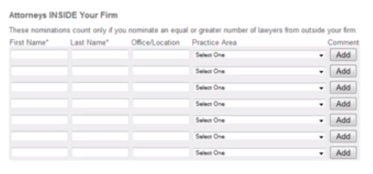
Out-firm:
And Rising Stars:
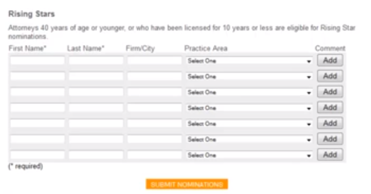
Include the lawyer’s first name, last name, firm or city, and practice area. Then include any personal comments you’d like to make for each lawyer by clicking the Add button at the right hand side of each entry. Then, click Submit Nominations.
Evaluate lawyers
While the nominations process is only open for a few months out of the year, you can leave comments or evaluate lawyers year round by clicking the Comment on/Evaluate Lawyers button in the top navigation menu.
![]()
Use this feature if you feel someone was overlooked for the nominations process or if you believe someone is on the list who shouldn’t be. Include the attorney’s name, firm name, website address, state, and any specific comments you have.
You can also toggle between several comment options:
![]()
Then, rate the attorney on a scale of Excellent to Poor in several professional categories. When finished, click Save and Another if you’d like to comment on another attorney. If you’re done commenting, click Save and Done.
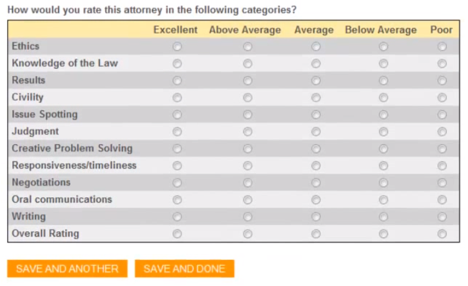
Advertising options
Finally, if you just have a basic profile, you can purchase an upgrade to an expanded or premium profile. to do this, click on the Store button in the top navigation menu.
![]()
From there, you can select from several items to add to your cart, including certificates and marquees commemorating your inclusion on a Super Lawyers or Rising Stars list.
You can also purchase an expanded profile from here.
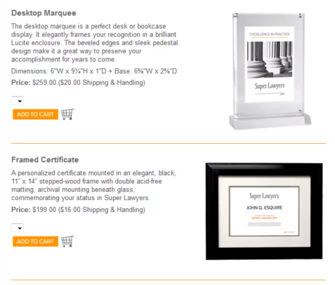
An Expanded Profile provides:
- Personalized bio information and a photo
- Public contact information
- Full view of your accomplishments, including verdicts, settlements, and honors
A Premium Profile provides:
- All the features of an expanded profile
- Prominent contact form on your profile
- Website, blog, and social media integration
- Premium placement in SuperLawyers.com search and directory
Here are a few views of a Premium Profile to compare with the Expanded Profile used in the Managing your SuperLawyers.com profile section above.
The contact form provides a compelling call-to-action:
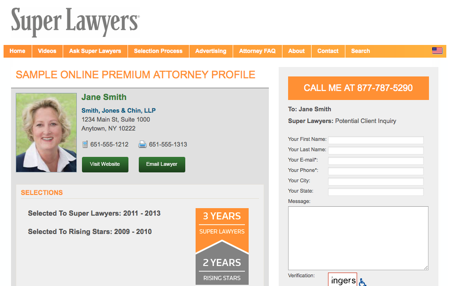
And comments made during the nominations process by other lawyers can also be featured front and center:

Social media gets plenty of fair play in Premium Profiles to boost your visibility:
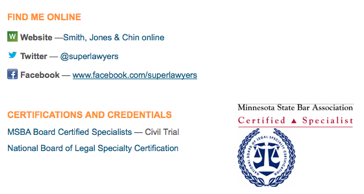
Print advertising
Since Super Lawyers distributes several regional and state print magazines, buying advertising in these publications can help increase visibility for your practice or firm.
Choose from Platinum Profiles:

Display Advertising:
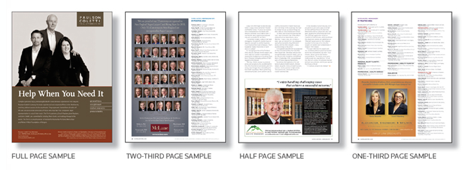
Ask Super Lawyers Display Ads:

Standard Profiles
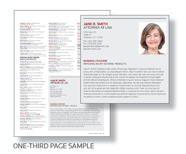
and Impact Advertising

All of the options offered by Super Lawyers cost money, but most attorneys view it as a serious investment in their personal brand and reputation management.
Facebook is the most popular social network yet many lawyers are reluctant to participate there. While there are legitimate concerns regarding privacy and solicitation, Facebook offers a unique opportunity to put a human face on your practice. Talking about your favorite football team or family functions on your profile and sharing stories that interest you on your business page can aid in client retention and growth. Plus, it can make the more aggressive lawyers out there appear a little less intimidating and more approachable, which is a good thing when you’re trying to acquire new clients.

Privacy concerns
Privacy is a real concern for lawyers. When dealing with private information on behalf of your clients, it’s important you keep a lockdown on what needs to remain out of the public eye. Of course, you still need to market yourself. So, how do you find a balance?
Get cozy with Facebook’s privacy settings
You shouldn’t just check out your privacy settings whenever one of those memes goes around saying you need to adjust your settings otherwise all of your dirty laundry will become public. You should check your settings on a regular basis. To do this, click on the cog icon in the upper right hand corner of the screen when logged into your account:
![]()
A list should drop down. Toward the bottom, there is an option for Privacy Settings. Click it.

You’ll then be taken to a page filled with settings and you can adjust each one by clicking the Edit button to the right of each option.

While you might think you can just go in and set everything to be viewed by your “Friends” and call it a day, you do actually need to go back and check these settings regularly. You see, whenever Facebook rolls out an update, they tend to adjust the privacy settings as well. And they always assume you want to share more with the world rather than less. This can result in some of your settings defaulting to “Public.”
When you create separate lists–like one for Family and one for Business–and share different content with each, a privacy settings flip flop could wreak havoc on your professional image.
Now that you know where to adjust your privacy settings, it’s important to understand what to do with them. In other words, what should you share with whom?
Establish personal privacy guidelines
The level of detail with which you go into your private life in public is ultimately up to you. But use common sense. You shouldn’t discuss details of cases in public, for instance. Neither should you make disparaging comments about colleagues. A good rule of thumb is to only share status updates, photos, etc., with people on your Friends list. Opt out of “Friends of Friends” sharing.
Don’t allow people to post to your timeline without your approval. Don’t let apps post on your timeline, period. Now that Graph Search has rolled out, more and more information about Facebook users is searchable. You can mitigate what people see by making these regular privacy settings checks as needed.
Set up groups for different types of people in your life. If you decide to become friends with clients, make sure you create groups or lists so you can quickly select who can see your posts. If you wish to share something more personal, you can select your family and friends group. If you want to share something about your favorite restaurant, you can select all of your groups–including clients–to see it.
Create a business page
Your Facebook profile is for you as an individual. It can be as professional or casual as you want, but one fact remains: it can’t be used to represent your practice or law firm. For business representation, you need a Facebook Page. People can write up reviews of your practice, post comments (if you let them), and engage with you as a professional.
This also helps to prevent any potential annoyance you may cause family and friends when you post business stuff on your personal profile. Some level of separation between your personal life and business life is not only expected, it’s encouraged.
How personal is too personal?
Some people are more outgoing than others. Some feel perfectly comfortable sharing all of the details of their lives with everyone they meet. However, this doesn’t mean everyone you meet wants to hear it! Use your brain. Ex:
“Just had a delicious dinner with my wife at Tony’s Pizzeria!” is fine for all to see. But “I’m sick and tired of [insert political party here]” is probably not the best idea.
Avoiding solicitation
Some states have very strict rules regarding solicitation. If you think for even a second your Facebook profile or page could violate your jurisdiction’s ethical rules, put a stop to your participation and read up on the specifics.
To be on the safe side, do the following:
- Include legal disclaimers where necessary
- Don’t ask for reviews from clients or anyone else
- Don’t push the hard sell with your advertising
- Don’t forego common sense in the pursuit of new clients
Facebook isn’t some mythical land where the rules don’t apply. If you can’t do it in your local newspaper, you probably can’t or shouldn’t do it on Facebook either.
Sometimes, law firms offer prizes for those who “Like” their Facebook pages. This is fine for the most part but tread carefully. It’s easy to slip into solicitation mode. Remember: a giveaway or contest reward should never be quid-pro-quo service or legal advice of any kind. Just don’t do it!
Attracting new clients
Beyond establishing your brand as an attorney, a presence on Facebook can help to attract new clients to you. But just setting up a profile and hoping for the best won’t work. You need to be engaging.
Be a resource and showcase your expertise
One of the best examples of expert-driven social media for lawyers is the page Cruise Law News. Not only does it have upwards of 79,000 likes–it provides content on a regularly basis that appeals to real people.

One way to demonstrate your status as an invaluable resource in your field is to offer links to news stories related to your area of practice. Include a brief summary (one-sentence) in your status to encourage the click-through.

You can also share your own articles, blog posts, and commentary. Really demonstrate the fact that you’re an expert.

Make full use of your profile
Another good example of Facebook usage for lawyers comes from Chavez & Valko, LLP. This immigration law firm finds the right balance between sharing information that promotes the firm and offers useful info to potential clients.
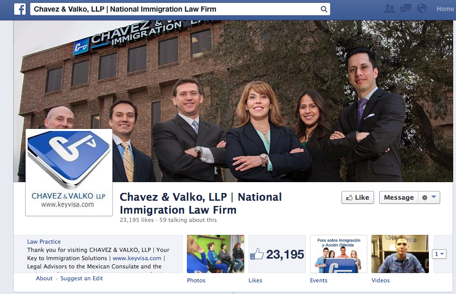
One way they really excel is by making full use of their profile. This means filling out every section in its entirety:
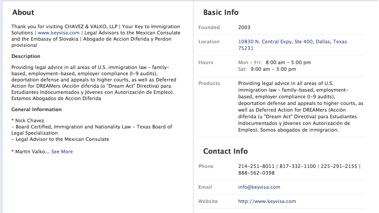
It also means adding content specifically for the Facebook page. Share public events your firm or practice will be hosting or taking part in. Share videos. If you have a mailing list, include a link to it.

Share personal photos from events
Photos add a personal touch to your page. Instead of always relying on stock photography, real photographs tell stories about your firm.

Interesting content always wins
When you’re not posting relevant news links, your blog posts, and photos, you can post interesting quotes:

Or interesting facts:

There’s really only one rule here: keep it interesting.
Engage with Facebook Groups
There are many Groups on Facebook devoted to a variety of topics and interests. Do a search for those related to your area of practice. Participate in discussions. Weigh in on important issues. Regular participation further establishes you as an expert and can drive traffic back to your page or profile.
Additional tips and tricks
Managing your Facebook presence is an on-going effort. Here are a few hints to build your following and stay sane:
- Experiment with your posting times. Post at 10 am and 4 pm for a week. Then switch to 9 and 3. Or 11 and 5. You get the picture. Play around with times to see which nets the most engagement.
- Respond to comments and questions promptly. Why? Real people respond!
- Ask questions in status updates to foster discussion.
- Install a Facebook button on your website to encourage more people to “Like” your page.
- Take a deep breath and count to 10 before responding to negative comments. Would you fly off the handle if you were to receive this criticism in-person? Avoid public meltdowns at all costs.
Out of all the non-lawyer specific online networks, LinkedIn ought to be the most intuitive in terms of importance. You see, it makes up 64% of click-throughs to corporate sites from social media. It’s platform is professional. Business info doesn’t get mixed up with general user talk. For lawyers specifically, the site offers unique benefits:
- LinkedIn profiles and pages for lawyers and law firms appear near the top of Google search results.
- It’s an easy way to “meet” new people and benefit from references.
- Your online résumé makes it simple to point to your experience and expertise without being overtly promotional.
- It takes up the mantel of the “word-of-mouth” tradition lawyers had to abide by for generating new prospects and clients.
- With over 100 million U.S.-based LinkedIn users, you’re missing out on numerous opportunities if you don’t sign up.
You used to have to buy a Martindale-Hubbell profile but now a LinkedIn profile–and at most, a premium profile–does a pretty comparable job.
Creating your profile
As with all of your social profiles, completeness is key. So, when you’re filling out the details for your LinkedIn profile, follow that same motto. Include your name, your primary title, your location, and your industry. Also, include a headshot. It’s very important that you convey a professional image, so invest in professional photos, if you can. You can also include the languages you speak, personal details like your birthday and relationship status, and your preferred contact method.
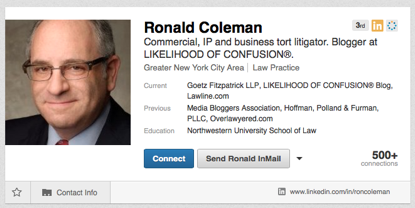
Next, complete the Summary section. This is where you get to write up a detailed biography of yourself. Speak in first person–we all know you’re writing it–and talk in relatable terms about your best jobs, accomplishments, honors, and achievements. For instance, if you’re a Super Lawyer, this is the place to state that.
Also, list out your specialties. This is a good opportunity to throw in a few relevant keywords about your practice and your expertise. But don’t keyword stuff!
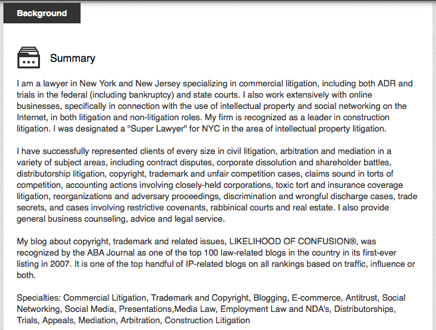
In the next section, outline your Experience. If you’re the head of your own practice, that should be listed first.
For each position you list, provide information about what you do/have done in the role. If you’ve received any honors, are completing/have completed any public projects, or have received recommendations in that position (which we will discuss more in a moment), they will be listed below your job description.
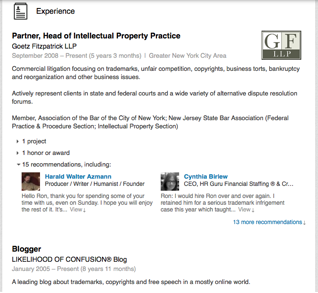
If you’ve received any honors or awards as a result of your job positions or even while in school, include them in the Honors & Awards section.
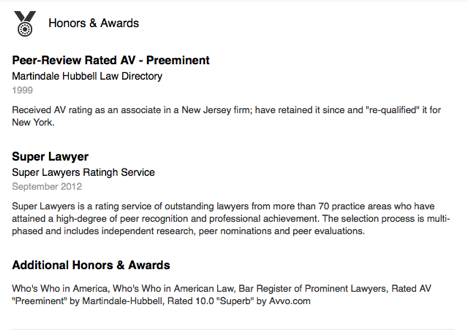
Next, outline your Skills & Expertise. You can input the focus areas of your practice and any other skills you have. As you expand your connections on LinkedIn, people will endorse you for these skills, lending further credence to your professional profile.
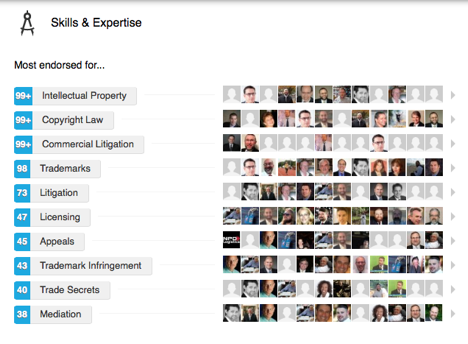
Your education comes next. Where you received your law degree should be listed first, of course.
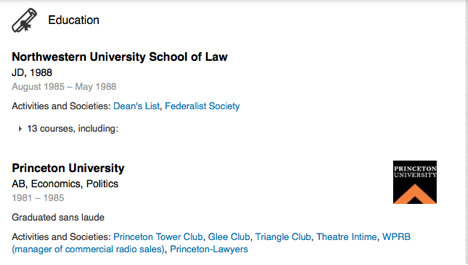
If you’ve completed any projects with your practice or firm, list those next. Include some relevant details about the project and add the people involved as team members.
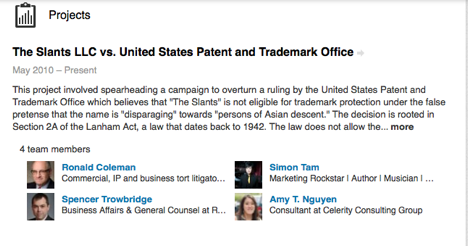
As a lawyer, you likely have articles published on a regular basis. Include these in the Publications section with the name of the article, the publication in which it appeared, and a brief description of its content.
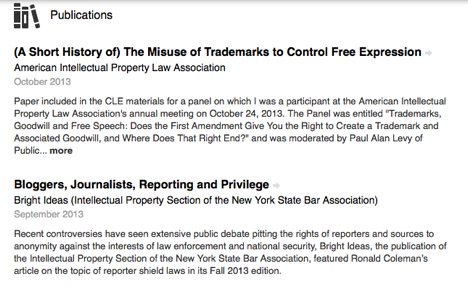
If you’ve made any media appearances, be sure to include video clips. They lend more authority to your profile and give interested clients the opportunity to see you in action.
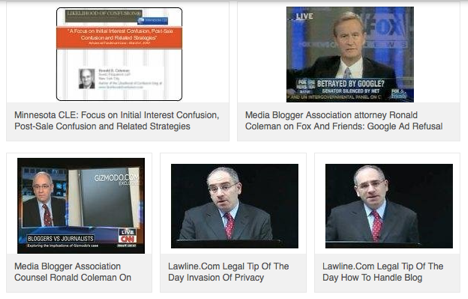
If you’re a member of any organizations, include them in the Organizations section.

You should also be certain to customize your profile’s URL. You can see what it currently is when viewing your live profile. Look beneath your profile snapshot:
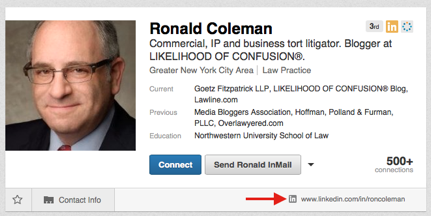
If it’s something like www.linkedin.com/in/94530230-jdfklsjgsg, then you’ll need to change it.
Ideally, you’ll change your profile URL to your name. If that’s already taken, try a combination of first initial + last name, first name_last name, and so on until you find one that works.
When you’re done, when someone visit your profile, they should see this in the URL box:
![]()
Creating your page
Company pages are much simpler than profiles but very important, nevertheless. A company page gives visitors direct, to-the-point information about your practice or law firm. Think of it as a bio for your company. Talk about what you do, how you do it, and what you’ve accomplished. Mention some of the achievements and honors you or other lawyers in your practice have received.
Also, include your headquarters location, website address, type of company, year founded, industry, and company size.
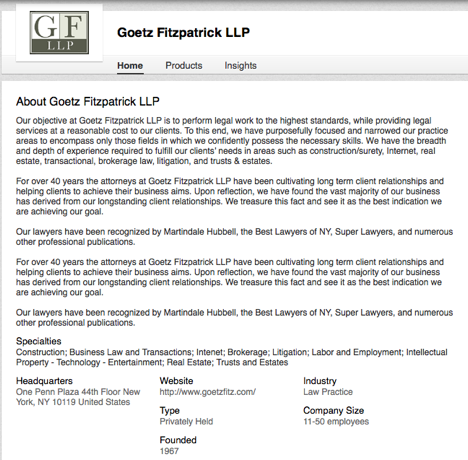
You probably don’t offer tangible products as a lawyer so you can skip that section. However, be sure to check out the Insights section. Once your page goes live, people who have worked at the practice (and have mentioned it in their profiles) will be linked to the company page. This expands your firm’s reach.
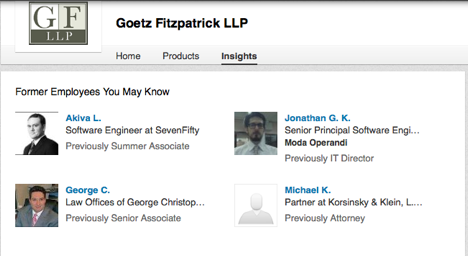
Expanding your connections
Once your profile and page are set up, you need to work on expanding your LinkedIn network. This means working to make connections with all the people with whom you’ve previously worked. Then, you’ll want to broaden your reach to forge new connections.
Join Groups
LinkedIn Groups allow you to connect with people with similar interests. It also allows you to demonstrate your expertise as a lawyer. Just a quick search for keywords related to your area of practice should yield numerous group results. You can join up to 50, so you’ll need to be somewhat selective.
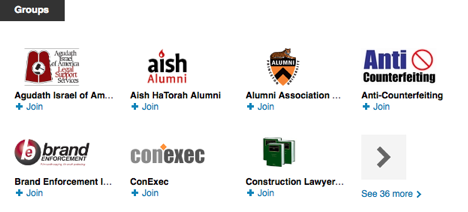
Once you’ve joined a group or two, go to its dedicated page and see what other members are talking about. Chime in on discussions. Answer questions. Ask questions. Post interesting articles and blog posts written by other people. This is not the place to advertise your services or promote your practice. Rather, this is where you demonstrate you know what you’re talking about.
Whatever you do, DON’T give legal advice or leak info protected by attorney/client privilege. Be smart about what you post. This goes for your conduct on all social networks and on the Internet at large.
You can also send InMail to other group members to establish relationships and to see if you can connect.
Get Introduced
Once you’ve made plenty of connections with those you already know, it’s time to connect with those you don’t. If you want to connect with someone in particular, visit their profile and click the arrow next to the Send NAME InMail button. A menu will drop down. Click on Get Introduced.
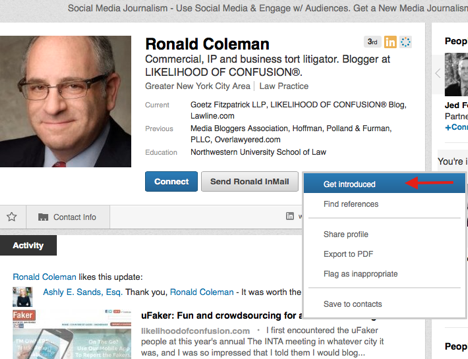
From there, you’ll be presented with a list of people to whom you’re connected that are connected to people who are connected with the person you’re interested in. Pick a person, write a personal note asking if they’ll introduce you and voila! Network expanded.
Be an active user
LinkedIn offers an area to make status updates. Use this regularly to provide links to recent blog posts or articles you’ve written and to curate content written by others. This social media stuff isn’t all about self-promotion–it’s about being an authority and helping others learn.
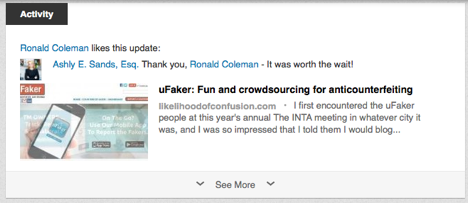
Leverage recommendations
Recommendations are LinkedIn’s version of reviews. You can get reviews from clients and peers here, both of which help to bolster your profile and reputation. People don’t have to make a recommendation, so when they do, it shows they really found value in your services.
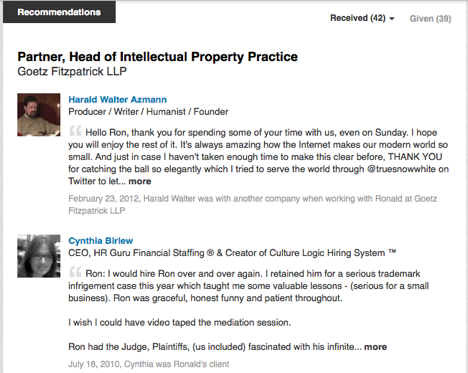
Yelp
When it comes to managing your online reputation, it’s important to have a presence where former clients can leave reviews for you. While you can’t solicit reviews as a lawyer, you still need to make yourself as open to this kind of feedback as possible. With that in mind, it’s essential to have a Yelp profile. In fact, it has around 108 million visitors per month as of late 2013. Also, when someone searches for your practice’s name + “review” they’re more likely than not going to see results from Yelp if you have a profile there. It increases visibility for your firm and if you amass a lot of positive reviews, this can be a very good thing.
One of the biggest problems with the site is a profile can be created for your firm or practice without your input. So, it’s really important you sign up so you can (a) make sure the company information is correct and (b) promptly respond to feedback and comments as the need arises. But more on that in a moment.
Setting up a profile
If making a quick search for your firm or practice on the site doesn’t produce a relevant result, you should create a profile from scratch. To do this, click the button that says Add Business at the bottom of the results page:

Or, go directly to http://biz.yelp.com and sign up for an account.
Once you’ve done this, you’ll see a screen that prompts you to input your law practice’s information, including business name, address, phone number, and website.
You will also be asked to select a category in which to place your business. Select one from the drop down list.
Click the check box next to “This business is open or opening soon.”
Uncheck the box next to “Write a review for this business.”
Finally, click Add Business.
It’ll typically take up to 48 hours for a Yelp moderator to review the listing and add it to the site.
It is a much more likely scenario that you will actually come across a listing for your legal practice that’s already up on Yelp, however. If this is the case, click Edit Business Info beneath the primary listing:
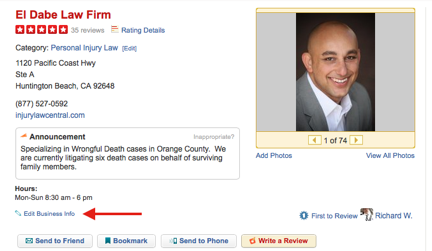
You’ll then be taken to a page that asks you to update the details about the business:
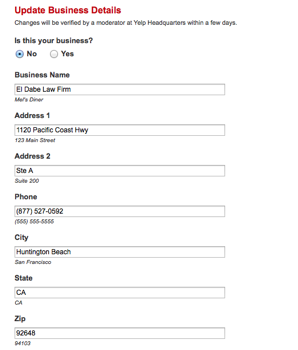
Once you’ve created a business listing for your practice, you’ll need to claim it. After it’s appeared live on the site, go to https://biz.yelp.com/claiming and click Claim My Business.
Search for your practice or firm once more. In the search results, you should see the option to “Unlock” the listing on the right-hand side of the screen. Once you click this, you’ll be asked to provide your name and email address and to agree to Yelp’s Terms of Service.
Your next step is to make your profile a bit more robust. Add your hours of operation and photos to capture attention. Fill out the About This Business section to give potential clients a full view of what to expect from your legal services. Include both information about what you do and who you are, since your personal bio is so important for your overall reputation as a lawyer:
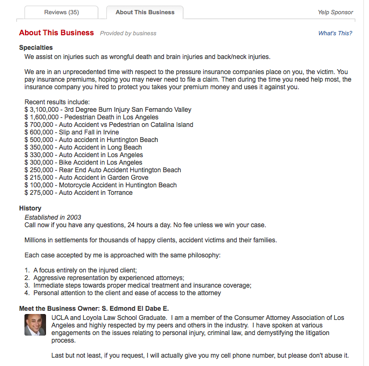
Also, make sure you use keywords related to your area of practice throughout the listing. Don’t keyword, but be mindful to use commonly-searched phrases in your industry.
Getting reviews
Yelp is a review site. So, your main objective on this site is to get reviews for your legal practice. However, depending on where you live, your state bar association might not look too kindly on reviews that border on “recommendations,” or reviews that delve into over-the-top praise, guarantee huge settlements, or guarantee case outcomes.
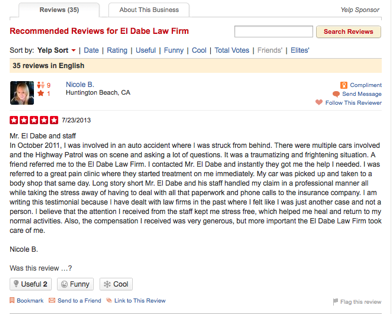
Of course, the value of a Yelp profile is huge. Just so long as you don’t outright solicit reviews from clients and you monitor your profile regularly to make sure reviews aren’t violating ethics rules, the benefits outweigh the potential drawbacks.
Managing negative feedback
Bad reviews happen to even the best of law offices. It’s how you deal with it that matters most.
Step 1: Make sure you have control of your profile. As we already discussed, it’s relatively easy to claim your Yelp profile. Doing so allows you to keep information up-to-date and monitor reviews as they come in.
Step 2: Respond to negative reviews. Yelp allows you to respond privately and publicly to reviews. If someone makes unfounded claims about your practice, respond publicly and attempt to set the record straight. If a negative review is truthful, reply to apologize and ask if there’s anything you can do to remedy the situation.
Step 3: Listen to criticism. If a review brings up legitimate complaints, make every effort to fix the noted problems moving forward.
Step 4: Report abusive reviews. While you don’t have the power to delete negative reviews (because what would be the point?) you can contact Yelp to point out particularly abusive or damaging reviews. After going over your case, the review may be taken down.

